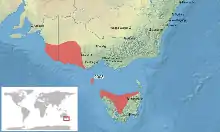| Geocrinia laevis | |
|---|---|
_(8743396751).jpg.webp) | |
| Scientific classification | |
| Domain: | Eukaryota |
| Kingdom: | Animalia |
| Phylum: | Chordata |
| Class: | Amphibia |
| Order: | Anura |
| Family: | Myobatrachidae |
| Genus: | Geocrinia |
| Species: | G. laevis |
| Binomial name | |
| Geocrinia laevis (Günther, 1864) | |
 | |
| Synonyms[2] | |
|
Pterophrynus laevis Günther, 1864 | |
Geocrinia laevis, the smooth frog,[3] southern smooth froglet,[1] smooth froglet,[1] or Tasmanian smooth frog,[2] is a species of frog in the family Myobatrachidae. It is endemic to Australia and found in Tasmania, southwestern Victoria (including the Grampians), and the extreme southeast of South Australia.[1][2][3]
Description
These frogs measure about 35 mm (1.4 in) in snout–vent length. They are grey or brown above, with scattered, small reddish spots with black edges, sometimes also with irregular, darker markings. The underside is white or light grey and has darker brown or grey flecks or mottling. Males have a bright yellow throat. The skin is smooth or with scattered low warts above, and smooth below.[3]
Habitat and conservation
Geocrinia laevis live in dry sclerophyll and pine forests at low altitudes.[1] They often occur in damp locations and areas flooded after rain.[1][3] The larvae develop in egg capsules until the breeding site is flooded, after which they hatch and continue development as aquatic tadpoles. The tadpole phase takes about six months.[1]
This species is threatened by habitat clearing for agriculture and grazing, as well as logging in Tasmania. However, the overall population is considered stable, and the species occurs in several protected areas.[1]
References
- 1 2 3 4 5 6 7 8 Murray Littlejohn, Peter Robertson, Graeme Gillespie, John Clarke, Peter Brown (2004). "Geocrinia laevis". IUCN Red List of Threatened Species. 2004: e.T41144A10405582. doi:10.2305/IUCN.UK.2004.RLTS.T41144A10405582.en. Retrieved 16 November 2021.
{{cite journal}}: CS1 maint: multiple names: authors list (link) - 1 2 3 Frost, Darrel R. (2016). "Geocrinia laevis (Günther, 1864)". Amphibian Species of the World: an Online Reference. Version 6.0. American Museum of Natural History. Retrieved 2 January 2017.
- 1 2 3 4 Harold Cogger (3 March 2014). Reptiles and Amphibians of Australia. Csiro Publishing. pp. 88–89. ISBN 978-0-643-10977-3.
External links
 Data related to Geocrinia laevis at Wikispecies
Data related to Geocrinia laevis at Wikispecies
